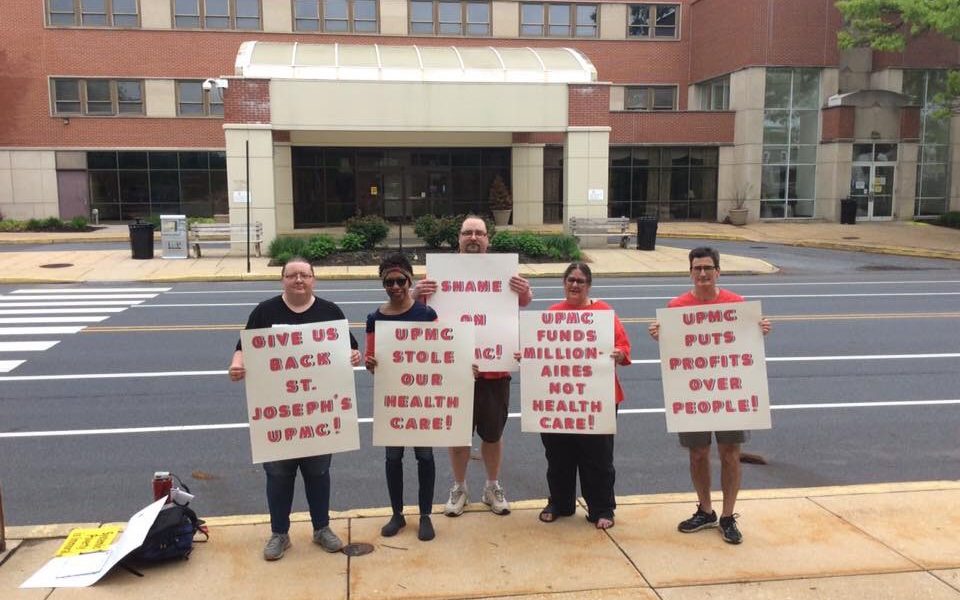Barbara White
On July 9th, the Campaign Team led 33 PPF-PA members and friends in a deep dive into the nature and importance of a Public Healthcare Advocate (PHA) for Pennsylvania. Achieving legislation to create this statewide office is one of our two medium-term campaigns. PPF-PA conducts this campaign to organize our communities, develop leaders and hold power-holders accountable to our policy vision.
Nijme started off with background on how PPF-PA decided on this goal. Her recent internal Facebook post explains:
Four years ago around this time we won the first ever public hearing on rising insurance premiums. Through a concerted campaign targeting the PA Insurance Department, we pressured using a petition, meetings with officials, call-in days, partner letters and other tactics.
Then the following year, we won not just one hearing, but statewide Town Halls as part of the rate review process. Across the state we received local press about how residents were calling for universal healthcare.
We learned that there is no one at the state level who fights for our healthcare rights, but insurance companies, hospital systems and other healthcare companies have lobbyists who have our state agencies on speed dial.
These successful campaigns which brought about more transparency, accountability and participation in the rate review process helped us sharpen our focus on building the Nonviolent Medicaid Army and the fight for a Public Healthcare Advocate!
Then PPF-PA Legislative Coordinator, Barbara White, explained how we’ve built momentum in the past year through our legislative visits. HRC members have had 25 legislative visits, gaining full support or openness to the PHA from most Democrats, and some Republicans we’ve visited. In the course of this campaign, many members have learned to develop briefs about the legislative records and campaign contributions of legislators, and detailed agendas to lead the legislators through our platform and goals, so our visits are well informed and carefully structured. The process has helped develop leadership among members, build relationships with legislators and teach us about how state government works.
PPF-PA Campaign Team Co-Coordinator, Borja Gutierrez, then led the group through the newly revised background document on the PHA (https://docs.google.com/document/d/14Q_xQ0DJh1u5bbPRMnjGQvN1aIwdoe3dxgTYVlsH-pY/edit) highlighting major issues, some of which are still under discussion, including:
- The PHA would have power to investigate, prosecute or mediate violations of laws or policies, and should be in relationship with the state attorney general’s office;
- The PHA would have broad power to “repair harm” caused by pre-existing or new situations;
- The PHA would communicate between the eight agencies which have some jurisdiction over healthcare, but which currently don’t coordinate or communicate with each other. This could be all important in emergency situations such as the pandemic;
- PHA legislation would create a Community Advisory Board, including stakeholders such as PPF-PA, to lift up the needs of poor & dispossessed working class people in PA.
Then followed group discussion of concerns, such as funding models, relationship to the AG, and how this campaign could dovetail with defunding and demilitarization demands, for state police and state prisons, and those funds could go to the PHA. Barbara explained that the Campaign Committee is working to step up the legislative campaign with more trainings on legislator briefs, and more legislative visits.
Finally, small breakout groups met to try to figure out how the PHA would address specific situations hurting people in Pennsylvania. The small groups discussed:
- What would the Public Healthcare Advocate do to advance the organizing around the cancer cluster in Southwest PA (and water and land contamination that poses a public healthcare threat)?
- What would the Public Healthcare Advocate do to advance the demand to release prisoners during COVID19?
- What would the Public Healthcare Advocate do to defend undcoumented people who are experiencing a health crisis when they are threatened with deportation?
- What would the Public Healthcare Advocate do about closed hospitals?
- What would the Public Healthcare Advocate do to advance the fight to restore the adult dental benefit in Medicaid?
- What would the Public Healthcare Advocate do to protect workers during the COVID19 crisis/the re-opening?
- What would the Public Healthcare Advocate do about the opioid crisis?
- What would the Public Healthcare Advocate do to advance the fight for housing as healthcare?
